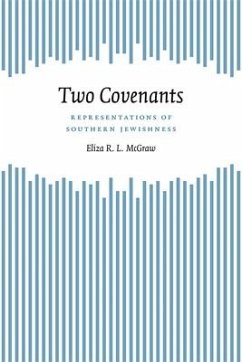Surveys of southern culture rarely assess the contributions of Jews, while histories of Jews in America virtually exclude those living in the South. Eliza R. L. McGraw's multifaceted study, Two Covenants, serves to fill both gaps and in doing so expands how we define the South. McGraw mines eclectic representations of southern Jewishness as varied as the Carolina Israelite newspaper, the Mardi Gras Krewe du Jieux, southern Baptist conversion-instruction pamphlets, and the film Driving Miss Daisy. She also considers literary representations of southern Jews in the works of both Jewish and non-Jewish writers, including Thomas Wolfe, Robert Penn Warren, Walker Percy, Lillian Hellman, David Cohn, Louis Rubin, Jr., Eli Evans, James Weldon Johnson, Jean Toomer, and Charles Chesnutt. While concerned with established concepts such as ethnicity and region, McGraw raises many questions that illustrate the complexity of southern Jewishness. Can one individual straddle two identities? How do race, class, and gender influence southern Jewishness? What are the differences between southern Jews and other southerners, or between southern Jews and other Jews? Does anti-Semitism manifest itself differently or with unique effects in the South? In suggesting answers to these and other questions, McGraw ranges widely over the southern cultural landscape and reveals that although southern Jewishness remains a marginal identity due to the small size of its constituency it nevertheless inhabits and helps to form the South at large.
Hinweis: Dieser Artikel kann nur an eine deutsche Lieferadresse ausgeliefert werden.
Hinweis: Dieser Artikel kann nur an eine deutsche Lieferadresse ausgeliefert werden.








